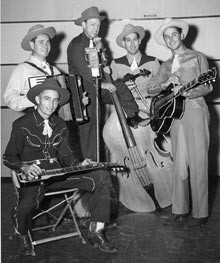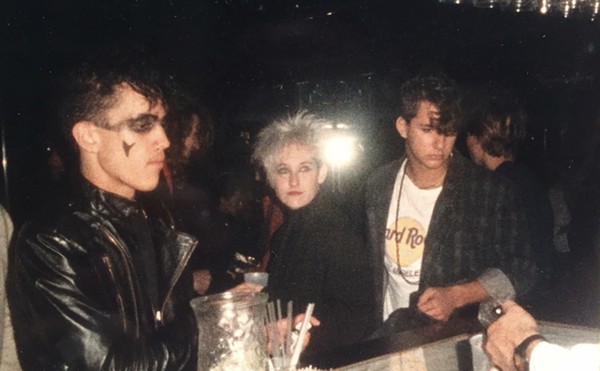It was a big night for folks in the little town of Electra, Texas. The Depression was on, but Milton Brown and his Musical Brownies had come to play, and folks were anxious to see the band live. The headlights of dusty farm trucks and Ford Roadsters washed over the weathered sides of the old VFW hall as the crowd arrived. It was a balmy night — shirt-sleeve weather — and the windows of the hall were propped wide open.
The audience watched the musicians gather around the piano to tune up, keeping a close eye on Bob Dunn, with his amazing, new-fangled electric steel guitar. Nobody had ever heard anything like it before. Only a few years earlier, Brown had invented what would become known as Western swing by adding a jazz piano player to a Texas string band; Texans were devoted to Brown's daily radio show. Yet when Bob Dunn put a pickup on his steel guitar and plugged it into am amplifier, the sound was so unusual that even the crickets around the hall stopped their noisy song. It was more than music. It was the sound of the future.
Not all of the fans were inside of the old VFW hall that night. Fifteen-year-old W. Wayne Locke stood in the darkness outside of an open window, taking it all in. The son of a fiddle-playing farmer, Locke had been born near Paris, Texas. The family moved around Texas and Louisiana before settling in the small, North Texas farming town of Electra in 1933. As a general rule, nothing much happened in Electra. But this was different. Milton Brown had come to play.
Locke got a guitar when he was 11 and was already performing at house parties and country dances with "one or two fiddles, and maybe a banjo." "We'd move the furniture back and play for dancing, then they'd pass the hat," he recalls. "We might make 50 cents apiece, and during the Depression, that was pretty good." Looking through the window at Bob Dunn, Locke had a new inspiration: the steel guitar. "I went to Wichita Falls and bought a piece of bird's eye maple. Then I had a fella at a radio repair shop in Electra make me a pickup and an amplifier. That's what I started with."
In 1939, Locke moved back to Paris, Texas, where he started a little group called the Mountaineer Boys, playing "schoolhouses and such." When he joined a band called the Rhythm Ranch Boys that played an early morning radio show on KPLT, Locke received the nickname "Sleepy."
Three years later, Locke moved to Dallas, where he got a job playing seven nights a week (with Sunday matinees) at Nan's #1 Nightclub. He eventually grew tired of the demanding schedule, although it didn't effect his playing. "Sleepy shucks that corn, and the people eat it up!" a fellow steel player shook his head in wonder. In 1944, after a short stint working in the oil fields, Sleepy headed South. When he arrived in San Antonio, he played with the Tune Twisters at "The Barn" out Highway 90 to Houston with future Texas Top Hands "Easy" Adams and "Knee-Hi" Holley.
Locke later joined the Texas Tumbleweeds ("We played a radio show on Friday as the Texas Tumbleweeds, and on Monday we were the Texas Top Hands."). The band already had a member nicknamed Sleepy (fiddler C.J. "Sleepy" Short), and held a contest to find Locke a new stage name. "Rusty" was the winner, and Locke has been known as such for 57 years since.
For decades, the Texas Top Hands were the hottest thing around, one of the most popular bands in the Southwest. The band appeared on WOAI, KONO, and KABC, starred in a couple of movies, and made so many recordings (including hits like "Bandera Waltz" and "Cotton-Eyed Joe") that even Locke has lost count. The band backed up everybody: Webb Pierce, Red River Dave, Tex Ritter, Big Bill Lister, Charlie Walker, and Little Jimmy Dickens — to name a few.
| Texas Top Hands, circa 1949. Front, Rusty Locke; rear left to right, Walter Kleypas, "Knee-Hi" Holley, "Easy" Adams, "Curly" Williams. |
In 1947, Locke got a chance to work with Bob Wills. "Bob was booked at the NCO Club at Randolph `Air Force Base`, and their steel man didn't make it, so they called me." A little advice from one of Bob's band members — "When Bob looks at you, let him know you've got it!" — wasn't difficult for Locke to take. "I knew all of Bob's tunes," he admits.
Locke managed the Texas Top Hands from 1952-55. During this time, the Top Hands were asked to back up Hank Williams. "It was December 16, 1952, out at Macdona Hall on Laredo Highway," Locke vividly remembers. "Hank was in terrible condition that night." The Top Hands had to help Williams get to the microphone. "He seemed to be in a daze," says Locke. Two weeks later, the 29-year-old Williams was dead.
Big Bill Lister, Opry star and Hank Williams frontman, who has played with Locke since the '50s on stage and on records says, "Rusty is a real innovative musician. He's one of the best, and a great guy."
Locke left the Top Hands in 1955. Steel Guitar Hall of Famer Denny Mathis remembers hearing Rusty Locke on the radio in the late '40s: "It was hearing Rusty Locke that made me want to play the steel guitar. He was a real inspiration to me." At this, Locke smiles. "When I left the Top Hands, Denny Mathis took my place. He plays real nice."
"In 1955, I started my own band, Rusty Locke and his Western Swing Band." They played jazz tunes like "Perdido" and "How High the Moon." "Instead of playing for the people, to make money, we played for musicians," says Locke with a grin. The group disbanded in 1957.
Locke continued to play off and on until he opened his Kirby TV Service in 1969. "I haven't played professionally since," he says. "Oh, I'll take a job once in a while, and I play at church, but that's all." Today, Locke lives quietly in Kirby with his wife Cora, and Sampson the Wonder Dog. He is 82 years old now — "Be 83, November first" — a little weathered, but ram-rod straight and as sharp as ever, with a twinkle in his eye. He started out listening to a legend in 1935, and along the way became a legend himself.
The Texas Top Hands are not well represented on CD re-releases but some examples of Rusty Locke's hot Western Swing steel guitar playing do exist if you're willing to dig for them:
Wanderers Swing: Texas Dance Hall Music
Released 1994 by Krazy Kat, CD11 (England)
27 rare cuts including:
Texas Top Hands
"You Can't Have Your Cake and Eat It Too." 1949
Big Bill Lister: There's a Tear In My Beer
Released 1999 by Bear Family Records, BCD16374 (Germany)
30 rare cuts including:
Bill Lister with the Texas Top Hands
"This Time Sweetheart" 1949
"Local Yokel" 1949
Diggin' Texas Swing — 1946-55
Released 1998 by Krazy Kat, CD24 (England)
27 rare cuts including:
Texas Top Hands
"12th Street Rag" 1950
"Quit Rockin' the Boat" 1952

















